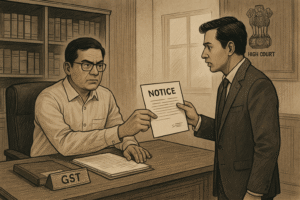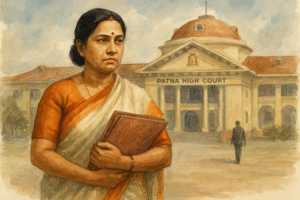Simplified Explanation of the Judgment
The Patna High Court recently dealt with a writ petition filed by a private contracting company challenging a demand order issued by the Central GST and Central Excise Department. The department had raised a demand of ₹10,60,415/- in service tax (including cess) for the financial years 2015–16 and 2016–17, along with interest and multiple penalties under the Finance Act, 1994 read with Section 174 of the CGST Act, 2017.
The petitioner sought to set aside the demand order dated 12 March 2024, arguing that:
- The company did not receive any show cause notice or notice for personal hearing.
- The issuance of such notices was in violation of the CBIC Circular dated 5 November 2019, particularly paragraphs 2 and 4.
- Several penalties imposed under different provisions were unjustified, including penalties for failure to register, failure to produce documents, and alleged suppression of facts.
The Union of India, represented by the Additional Solicitor General of India and Senior Standing Counsel for CGST, opposed the petition, contending that the petitioner had an available statutory remedy—filing an appeal before the Appellate Authority. The government argued that without exhausting this remedy, the petitioner’s approach to the High Court was premature.
Upon examination, the Court noted that although the petitioner claimed non-receipt of notices, the impugned order itself mentioned that a Chartered Accountant, authorised by the petitioner, had appeared for a personal hearing before the authorities. This indicated that the petitioner had participated in the proceedings.
The Court further held that:
- The question of compliance with the CBIC Circular should be examined by the Appellate Authority during the appeal process.
- Relying on the Supreme Court’s decision in State of Jammu and Kashmir v. R.K. Zalpuri (AIR 2016 SC 3006), the Court reiterated that when a statutory appellate remedy exists, it must be exhausted first unless there is a clear violation of natural justice or statutory provisions—neither of which was proved here.
As a result, the High Court declined to interfere and disposed of the writ petition with the following directions:
- The petitioner must approach the Appellate Authority by filing a statutory appeal.
- If an appeal is filed, the Appellate Authority should decide it within six months from receipt.
- The Appellate Authority should consider Section 14 of the Limitation Act for condoning delay, accounting for the time spent by the petitioner in the High Court.
- The petitioner may file an interlocutory application seeking interim relief in the appeal.
In essence, the Court emphasised that the High Court’s writ jurisdiction is not meant to bypass established appeal mechanisms unless exceptional grounds exist.
Significance or Implication of the Judgment
This judgment reinforces a well-settled legal principle: where a statutory appellate remedy exists, parties must first pursue that remedy before invoking the High Court’s writ jurisdiction under Article 226 of the Constitution. The decision is significant for businesses and tax professionals because it clarifies that:
- Mere allegations of procedural lapses—like non-receipt of notices—will not be sufficient if there is evidence of participation in departmental proceedings.
- Taxpayers cannot bypass the appeal mechanism simply to expedite relief unless they can demonstrate clear and substantial violations of law or natural justice.
- The judgment also shows the Court’s willingness to direct appellate bodies to expedite hearings and consider delays caused by litigation in higher courts.
For government departments, it affirms the legitimacy of departmental adjudication when due process is followed, while also reminding authorities to strictly adhere to procedural requirements to avoid future challenges.
Legal Issue(s) Decided and the Court’s Decision with Reasoning
- Whether the writ petition was maintainable despite the availability of a statutory appellate remedy
- Decision: No. The Court held that since an appeal remedy existed, the petitioner must use it first, following the principle laid down in R.K. Zalpuri.
- Whether alleged non-service of notices justified direct interference by the High Court
- Decision: No. The Court noted that the petitioner’s authorised representative had attended the personal hearing, indicating knowledge and participation.
- Whether the CBIC Circular dated 5 November 2019 could be considered by the High Court at this stage
- Decision: No. The Court held that such arguments should be placed before the Appellate Authority during the appeal process.
Judgments Relied Upon or Cited by Court
- State of Jammu and Kashmir v. R.K. Zalpuri, AIR 2016 SC 3006 (Para 20)
Case Title
M/s Ishwar and Co. Contract Pvt. Ltd. v. Union of India & Ors.
Case Number
Civil Writ Jurisdiction Case No. 10638 of 2024
Coram and Names of Judges
Hon’ble Mr. Justice P. B. Bajanthri
Hon’ble Mr. Justice Alok Kumar Sinha
Names of Advocates and Who They Appeared For
- For the Petitioner: Ms. Archana Sinha @ Archana Shahi, Senior Advocate
- For the Respondent–Union of India: Dr. Krishna Nandan Singh, ASGI; Mr. Anshuman Singh, Sr. SC, CGST & CX; Mr. Mayank Mishra, JC to ASG; Mr. Amarjeet, JC to ASG
Link to Judgment
36e0bbef-1349-42fb-a8d0-f3389b0a61ae.pdf
If you found this explanation helpful and wish to stay informed about how legal developments may affect your rights in Bihar, you may consider following Samvida Law Associates for more updates.








